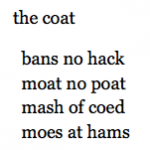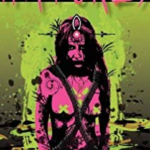2015
In this essay John Cayley reviews Nick Montfort’s #!, a book of computer generated poetry and the code that generated it. Exploring the triangle of Montfort’s programs, the machines that read them, and the output presented for human readers, Cayley situates the experience of reading and writing as intrinsically virtual, powered by its sustained potentiality, rather than its definitive comprehension.
In his review of Stefan Herbrechter’s Posthumanism: A Critical Analysis, John Bruni addresses the technoscientific and philosophical varieties of posthumanism, and considers the necessity of moving beyond the “dehumanizing” effects of technocentric theories of cultural evolution. This critical project seeks to preserve freedom and agency, rejecting a concept of posthumanism as a side-effect of innovation in favor of one that sees change itself arising from social processes.
2014
In one half of a pair of critical reviews looking at recent titles in animal studies, Karl Steel examines Nicole Shukin's Animal Capital (Shukin reviews Steel in the other half). In particular, Steel looks at Shukin's biopolitical framework, and considers how that framework challenges not only our conception of what constitutes the animal, but also--and more to the bone--our conception of the capacity of fields like animal studies.
In one half of a pair of critical reviews looking at recent titles in animal studies, Nicole Shukin examines Karl Steel's How to Make a Human (Steel reviews Shukin in the other half). In particular, Shukin discusses Steel's framing of "the human" in terms of medieval violence, and she considers what that framing can offer to today's political and ethical conversations.
Maria Engberg reviews two books that describe the dialectical relationship between literary production, digital media, and literary reception from opposite ends of the historical and aesthetic spectrum. "Literary paleontologist" C.T. Funkhouser examines the born-digital poetry of the 1950s (and earlier), while Johanna Drucker writes an eye-witness account of the contemporary encounter between print literature, humanities research, and "speculative computing."
2013
According to Fabienne Collignon, Timothy Melley’s refusal to submit “clear vectors of resistance” to "so-called democratic states" in The Covert Sphere is far from a shortcoming of the work, and instead marks its distinct quality. The absence of clear political solution, Collignon contends, informs The Covert Sphere’s achievement as a call for a change of mind in a population who, wittingly or not, have "participated in, and continue to collaborate with, a system of pretended innocence and victimization."
Maria Damon reviews Alan Sondheim's Writing Under: Selections from the Internet Text in light of the literature of John Fahey to demonstrate that those texts, like her performative review of them, enact a "mastering/dismantling itch twitch" that has a "life of its own, moving through the artist in a parasitic way."
Andrew Reynolds reviews Stephen Schryer’s Fantasies of the New Class: Ideologies of Professionalism in Post-World War II American Fiction, which argues for an instrumental form of intellectual labor in the service of broader social goals. Comparing novelists and sociologists representative of this new class, Schryer detects a self-defeating strategy in their rejection of collective instrumentalism in favor of individual dissemination of cultural education. Where Schryer closes by criticizing recent conceptions of an alternative economy of non-instrumental intellectual work within the university as a fantasy, Reynolds observes a “performative contradiction” at work in Schryer’s text and suggests that it is a good thing.
2012
The good news in Alex Link's review is that Karin Hoepker's No Maps for These Territories begins the necessary work on spatiality in William Gibson's first two trilogies. Still, much remains to be done. Link points the way to a critically productive analysis built on Hoepker's opening moves.
No need to get excited. According to Julie Reiser, The Affect Theory Reader offers the reader no end of theory but little affect. Reiser suggests this points to a broader and systemic problem in any reading or theory of affect.
Dennis Cooper's disorienting novel, The Sluts, complicates reader expectations about subjectivity and identity. As a result, Megan Milks notes that it "is either the most honest or the most dishonest literature I have come across."
2011
Literature joins the living dead. A critic illuminates Brian Lennon's "scene" of literature today: both suspended and emergent in the world system.
From early modern texts to "publishing events," Madeleine Monson-Rosen's review follows Matt Cohen's exploration of the "networked wilderness." It turns out that the English colonists and native Americans were already information theorists, centuries before cybernetics emerged at MIT.
Richard Kalich's latest protagonist is Richard Kalich, but one critic views this postmodern occupation of the novel as an opportunity - even an encouragement - to forget about him.
Beginning his review by reflecting on the book's cover art, John Bruni speculates that a punk aesthetic runs throughout Alaimo's posthuman environmentalism. Providing brief treatments of each chapter, he argues that the book's trans-corporeal understanding of the relationship between bodies and places disrupts "the very heart of what we know about ourselves."
How does one write science fiction when the atom bomb (and later 9/11) makes the future seem impossible to predict? Justin Roby reviews Paul Youngquist's Cyberfiction: After the Future, which explores how postwar "cy-fi" critiqued life in the age of cybernetic control systems.
"What would a history of postwar U.S. literature look like that did not take society as its major organizing principle?" Daniel Worden reviews Michael Clune's American Literature and the Free Market, 1945-2000, which traces the emergence of the "economic fiction," in which the market is neither a mystified form of social relations nor an expression of individual values, but a virtual economy that structures experience.
Anthony Warde traces Daniel Punday's analysis of the intertwining strands of contemporary "fictionality," the different modes - from "myth" to "assemblage" - by which invented stories are legitimated. Punday's work implies that the active construction of 'life-fictions' is becoming more significant in contemporary technoculture, a view that runs counter to the more pessimistic view of agency in Baudrillard's Simulacrum America and other accounts of a wholly 'virtual' reality.
2010
David Haeselin reviews Ted Striphas' The Late Age of Print, which explores the crucial role of book publishing in today's society of controlled consumption. The oft-repeated death knell for reading, Striphas argues, is the equivalent to a Fox News jeremiad on the death of American morality: it's wholly ideological and selective.
2009
Bruce Clarke reviews Joseph Caroll's Literary Darwinism and (like Laura Walls in her review of E.O. Wilson ten years earlier in ebr)identifies the LD project not as "consilience" so much as the colonization of the literary humanities by one branch of the biological sciences. In Caroll, Clarke discerns a Darwinian fundamentalism to match the Christian fundamentalism that can be observed in Clarke's own Lubbock, TX habitat.



